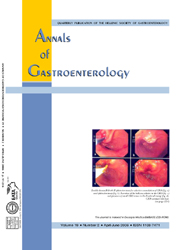Management of refractory Inflammatory Bowel Disease
Abstract
Medical management of active inflammatory bowel disease(IBD) depends on the extent and the severity of the disease
estimated by both clinical and endoscopic parameters. Based
on these parameters a flare of IBD, either of ulcerative colitis
(UC) or of Crohns disease (CD) can be mild, moderate
or severe. Mild or moderate IBD is treated on an outpatient
basis, while severe disease requires hospitalization. Although
in the literature there is no clear cut definition of resistance,
we characterize as refractory the disease that does not respond
to drug treatment, consisting of salicylates and steroids
in doses appropriate for the severity of the episode for a
four week period in combination with topical therapy. In severe
IBD the critical period is much shorter (5 days).
In refractory mild IBD, steroids (prednisone 20-40 mg)
combined with a double dose of topical treatment are appropriate.
In refractory moderate disease, therapeutic options
are: the intensive scheme of severe disease, immunomodulators,
Infliximab or consideration for surgery. In
refractory severe cases cyclosporine (mainly for UC) or Infliximab
either early or after cyclosporine failure appear to
be effective approaches, which must be compared to surgical
treatment in controlled clinical trials.
In conclusion, although refractory IBD is a challenge for the
clinician there are several therapeutic options. Apart from
old friends (steroids, immunomodulators, surgery) the new
group of biologic agents, in the form of anti-TNF factor (Infliximab
at present), has emerged as an option in the medical
management of moderate, severe and refractory IBD. Key words: Inflammatory bowel disease, IBD, ulcerative
colitis, Crohns disease, refractory IBD.




